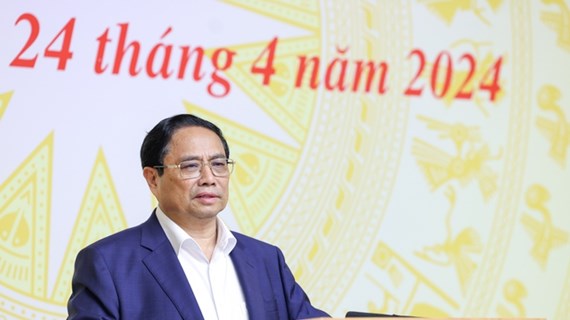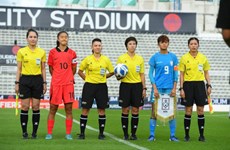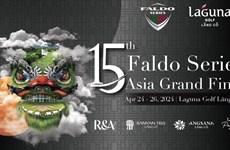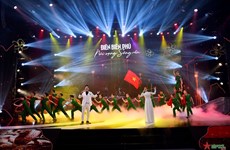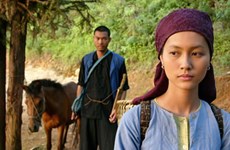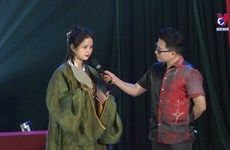Wildly inaccurate film on Uncle Ho criticized
Director and People’s Artist Dao Trong Khanh has written an article
slamming a documentary film called “Truth about Ho Chi Minh” which was
recently produced overseas by a group of exiles, for distorting the
history of President Ho Chi Minh.
Director and People’s Artist Dao Trong Khanh has written an article
slamming a documentary film called “Truth about Ho Chi Minh” which was
recently produced overseas by a group of exiles, for distorting the
history of President Ho Chi Minh.
First of all Khanh, a respected director of documentary films in Vietnam, affirms that “Truth about Ho Chi Minh”, though a documentary, contains no documentary value because of patchy and poor images which were used carelessly just to illustrate their quotations.
“With music and the opening made in a theoretical manner, the film quoted Stephane Coustois’s saying that, ‘People say history is the science of human misfortune and the century of bloody violence in which we are living has confirmed this saying broadly.’ But the truth is, history is not just like that. Unceasing efforts and creativity, the non-stop struggle for progress, and the pursuit of freedom and happiness are basics of miraculous historical movements in the noble spirit of humanity, including the sacrifice of revolutionaries worldwide. The ambiguous and one-sided way of presenting an issue in a gloomy and tragic manner inevitably results in a one-sided interpretation of the content of the film,” writes the director.
Khanh further points out that the images of massacres introduced in the film are in fact pictures and documentaries of the crimes committed by the French colonialists and US aggressors against the Vietnamese people. But in this film, their real origins are ignored and they are attributed to patriotic resistance fighters and communist soldiers. In addition, a line-up of anti-communist maniacs are used to stage “radiofilm” interviews - monologues without any illustrations.
He writes, “It makes no sense at all when one after another characters speak in a serious manner about President Ho Chi Minh’s birthday and death date – facts that Vietnam has officially announced. Vu Ngu Chieu and Tran Gia Phung have laid stress on a letter from Nguyen Tat Thanh (Ho Chi Minh) asking for enrolment at a French school in 1912. It should not be forgotten that during this period it was necessary to seek all possible ways to help the country and the people.”
“Sophie Quinn Judge, who lives in a capitalist society and does not understand anything about revolutionary activities, made a wild guess about the relationship between President Ho Chi Minh and other women like famous revolutionary Nguyen Thi Minh Khai. ‘There seems to have been an affair between the two,’ said Quinn in the film. This is not the way researchers do their work. Researchers do not use the word ‘seems’,” the director says, adding how can one believe in a researcher like Vu Ngu Chieu who has wrapped himself up in foreign archives for many years to engage only in gossip and other people’s private affairs that are unrelated to history.
People’s Artist Khanh, who himself made a documentary about President Ho Chi Minh, says when compiling documents about the President he had a chance to read the original copy of the “Prison Diary” poem collection but did not pay attention to Uncle Ho’s handwritings on the cover: 1923-1933. After many years, when some people showed interest in this matter, the then Vice Director of the Ho Chi Minh museum Nguyen Huy Hoan said the note just to mark the 10-year “big misfortune” period according to Uncle Ho’s calculation, not the time he penned the poems, adding that people do not understand this so tend to speculate.
Khanh said he also knew about the meeting between poet Pavel Antolkolski, who translated the “Prison Diary” poem collections into Russian, and President Ho Chi Minh, as well as the meeting between the President and R. Bershatsky when this poet visited Vietnam. During this meeting, with his openness and in his usual modest manner, the President made coffee for his guest and said, “We write poetry when we have free time. In Vietnam , everybody writes poems,” he recalled. The President did not think of himself as a poet but the whole world is captivated by his eloquent verses. Against this honourable history, the sabotage and slandering campaigns of exile groups overseas are so mean, Khanh said.
According to the People’s Artist, researching Ho Chi Minh heritage and learning about his thoughts and morality is not only a long and huge scientific research project but also a conscious evolvement of a nation towards “The true, the good and the beautiful”. He stresses that hatred, slander and fabrications reflects the degradation in personality which goes against human beings’ spiritual evolution and advancement, binding oneself and losing the one’s root.
“It is true that the life of President Ho Chi Minh is a legend. The legend is always beautiful. It contains the mystery of romantic spirit and the transcendence of human awareness about the world. US journalist William J. Duiler had written in his book about Ho Chi Minh: “All great people have an implicit mystery”. He cited President Ho Chi Minh as saying in an interview with journalist Bernard Fall that, “The elderly like to have a small mystery about them. I would like to keep a little bit of mystery about myself. I believe you understand what I said.”
The legend of Ho Chi Minh will forever be treasured by mankind and mankind will always try to seek more understanding about it, Director and People’s Artist Dao Trong Khanh concluded./.
First of all Khanh, a respected director of documentary films in Vietnam, affirms that “Truth about Ho Chi Minh”, though a documentary, contains no documentary value because of patchy and poor images which were used carelessly just to illustrate their quotations.
“With music and the opening made in a theoretical manner, the film quoted Stephane Coustois’s saying that, ‘People say history is the science of human misfortune and the century of bloody violence in which we are living has confirmed this saying broadly.’ But the truth is, history is not just like that. Unceasing efforts and creativity, the non-stop struggle for progress, and the pursuit of freedom and happiness are basics of miraculous historical movements in the noble spirit of humanity, including the sacrifice of revolutionaries worldwide. The ambiguous and one-sided way of presenting an issue in a gloomy and tragic manner inevitably results in a one-sided interpretation of the content of the film,” writes the director.
Khanh further points out that the images of massacres introduced in the film are in fact pictures and documentaries of the crimes committed by the French colonialists and US aggressors against the Vietnamese people. But in this film, their real origins are ignored and they are attributed to patriotic resistance fighters and communist soldiers. In addition, a line-up of anti-communist maniacs are used to stage “radiofilm” interviews - monologues without any illustrations.
He writes, “It makes no sense at all when one after another characters speak in a serious manner about President Ho Chi Minh’s birthday and death date – facts that Vietnam has officially announced. Vu Ngu Chieu and Tran Gia Phung have laid stress on a letter from Nguyen Tat Thanh (Ho Chi Minh) asking for enrolment at a French school in 1912. It should not be forgotten that during this period it was necessary to seek all possible ways to help the country and the people.”
“Sophie Quinn Judge, who lives in a capitalist society and does not understand anything about revolutionary activities, made a wild guess about the relationship between President Ho Chi Minh and other women like famous revolutionary Nguyen Thi Minh Khai. ‘There seems to have been an affair between the two,’ said Quinn in the film. This is not the way researchers do their work. Researchers do not use the word ‘seems’,” the director says, adding how can one believe in a researcher like Vu Ngu Chieu who has wrapped himself up in foreign archives for many years to engage only in gossip and other people’s private affairs that are unrelated to history.
People’s Artist Khanh, who himself made a documentary about President Ho Chi Minh, says when compiling documents about the President he had a chance to read the original copy of the “Prison Diary” poem collection but did not pay attention to Uncle Ho’s handwritings on the cover: 1923-1933. After many years, when some people showed interest in this matter, the then Vice Director of the Ho Chi Minh museum Nguyen Huy Hoan said the note just to mark the 10-year “big misfortune” period according to Uncle Ho’s calculation, not the time he penned the poems, adding that people do not understand this so tend to speculate.
Khanh said he also knew about the meeting between poet Pavel Antolkolski, who translated the “Prison Diary” poem collections into Russian, and President Ho Chi Minh, as well as the meeting between the President and R. Bershatsky when this poet visited Vietnam. During this meeting, with his openness and in his usual modest manner, the President made coffee for his guest and said, “We write poetry when we have free time. In Vietnam , everybody writes poems,” he recalled. The President did not think of himself as a poet but the whole world is captivated by his eloquent verses. Against this honourable history, the sabotage and slandering campaigns of exile groups overseas are so mean, Khanh said.
According to the People’s Artist, researching Ho Chi Minh heritage and learning about his thoughts and morality is not only a long and huge scientific research project but also a conscious evolvement of a nation towards “The true, the good and the beautiful”. He stresses that hatred, slander and fabrications reflects the degradation in personality which goes against human beings’ spiritual evolution and advancement, binding oneself and losing the one’s root.
“It is true that the life of President Ho Chi Minh is a legend. The legend is always beautiful. It contains the mystery of romantic spirit and the transcendence of human awareness about the world. US journalist William J. Duiler had written in his book about Ho Chi Minh: “All great people have an implicit mystery”. He cited President Ho Chi Minh as saying in an interview with journalist Bernard Fall that, “The elderly like to have a small mystery about them. I would like to keep a little bit of mystery about myself. I believe you understand what I said.”
The legend of Ho Chi Minh will forever be treasured by mankind and mankind will always try to seek more understanding about it, Director and People’s Artist Dao Trong Khanh concluded./.





